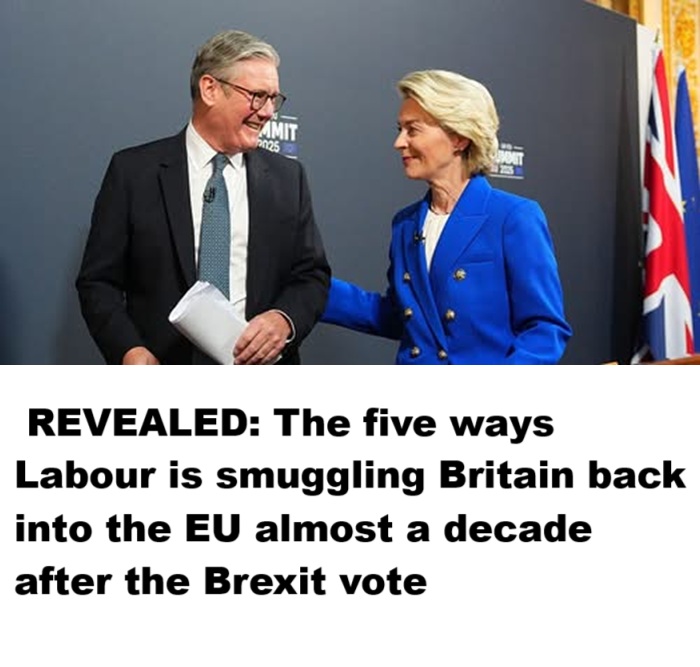
REVEALED: The five ways Labour is smuggling Britain back into the EU almost a decade after the Brexit vote
Nine years after Britain’s historic vote to leave the EU, Sir Keir Starmer is resetting relations with our largest trading partner.
His actions have been branded a “Brexit betrayal” by his critics, who claim the PM is surrendering Britain’s hard-won sovereignty via the back door.
The Government has signed several new agreements with the EU since sweeping to power and hinted that further deals are in the offing.
These include changes to youth mobility, closer ties over defence and a commitment to net zero.
 Keir Starmer alongside Ursula von der LeyenPA
Keir Starmer alongside Ursula von der LeyenPA
This closer alignment prompted Shadow Foreign Secretary and Tory MP Dame Priti Patel to warn that “Labour’s Brexit betrayal has begun”, adding: “They spent every day in opposition, blocking Brexit. Starmer and his Government are sabotaging our Brexit freedoms and surrendering our sovereignty.
“They want to impose EU laws on us through the back door, make Britain a rule-taker and subject us to ECJ decisions.”
To mark the ninth anniversary of the historic Brexit referendum on June 23rd, here’s a look at five ways Starmer is bringing Britain back into the EU’s orbit.
Youth Mobility
The European Union has given the go-ahead for youth visas with the UK, following the announcement of a post-Brexit deal last month.
Campaigners have welcomed the decision, in what they called a “massive step forward for young people in the UK”.
The scheme, which will apply to 18-30 year olds, will allow Britons to work in Europe and Europeans to work in Britain.
It will mean young people can live and work in each other’s nations for up to two years.
A senior economist warned the proposition could be “terrifying” and potentially open the floodgates to migrants from across Europe.

The UK and EU have collectively trained more than 120,000 Ukrainian troops
GETTY
EU-UK defence pact
The UK and EU’s close alliance is evident in the closely aligned defence pact, with a new, expansive agreement deepening security and defence cooperation between the two.
This includes partnerships such as collectively training more than 120,000 Ukrainian troops and cooperation in the Balkans, Indo-Pacific, and Sahel regions.
Both parties have committed to closer coordination at sea, including operations in contested waters like the Red Sea.
The agreement states: “The UK and the EU are committed to strengthening their partnership in security and defence.”
Britain will also be invited to EU high-level defence events, including the Schuman Security and Defence Forum, and EU officials may take part in UK-led meetings.
However, the deal, announced at the “EU Reset summit” last month, has sparked outrage among fishing communities nationwide.
The agreement, which states “We note the political agreements leading to full reciprocal access to waters to fish until 30 June 2038”, could have serious repercussions for Labour’s newly won coastal seats, we previously revealed.

The new EU-UK food standards deal has raised concerns for officials
GETTY
Food Standards
The new EU-UK food standards deal raises concerns for officials from the EU Food Safety Authority inspecting British farms and British ports to monitor compliance.
After not leaving the single market when the rest of the UK departed, the EU infamously applied these checks to Northern Ireland, subject to dynamic alignment thanks to the Windsor Framework.
Concerns are now being raised that the rest of the UK could follow suit with the easing of border checks and movement of products.
The UK has already pledged to join a Common Phytosanitary Area with the EU, meaning it must align with EU food standards, which will apply across the entire UK, regardless of whether producers are selling to the EU or not.
Critics have accused the Prime Minister of effectively handing control of “every aspect of food production and safety in the UK” to the European Union.
The agreement, made during the summit on May 18, also gives the EU authority over what food Britain may import from countries outside the bloc.
This marks a significant shift in the UK’s post-Brexit relationship with the EU, with supporters claiming alignment will lead to higher food standards and improved public health outcomes.

Households could face higher energy bills with Starmer’s plans to move the UK into the EU’s carbon market
PA
Net zero
Households in Britain could face higher energy bills following Starmer’s plans to move the UK into the EU’s carbon market.
The move will tie up British firms to Brussels’ climate laws and rising pollution charges. Carbon prices have since increased by six per cent following the news, with fears it could match Europe’s, meaning every ton will cost an additional £6.
An energy insider has warned gas power stations will now face higher carbon prices.
Shadow Energy Secretary Andrew Bowie stated the link-up “leaves the door wide open for higher energy bills and new taxes on transport”.
Ex-Brexit negotiator Lord Frost added: “Want to weaken our Net Zero commitments? In future, only if the EU says so.”
Product Standards
The Product Regulation and Metrology Bill has moved further along through Parliament and is emerging as a key piece of post-Brexit legislation with significant implications for UK sovereignty.
Now in its third reading in the House of Commons, the bill grants ministers wide-ranging powers to align British product standards with EU regulations across most consumer and industrial goods, but excludes food, aircraft, and medicines.
It aims to prevent regulatory divergence between Britain and Northern Ireland, still under the Windsor Framework.
Lord Frost and others see the move as a dangerous step toward eroding UK independence, claiming it allows the EU to influence UK law indirectly through Northern Ireland.
Frost described it as a “stealth” reattachment to EU rules, warning of a slow return to Brussels’ orbit.